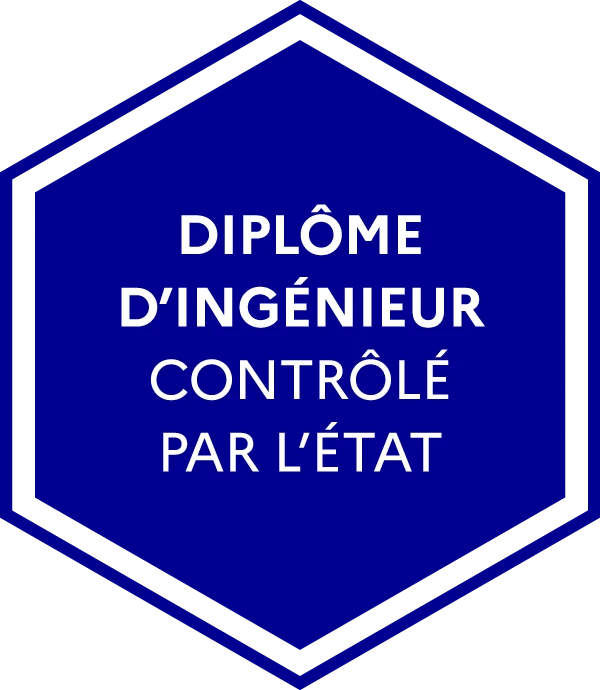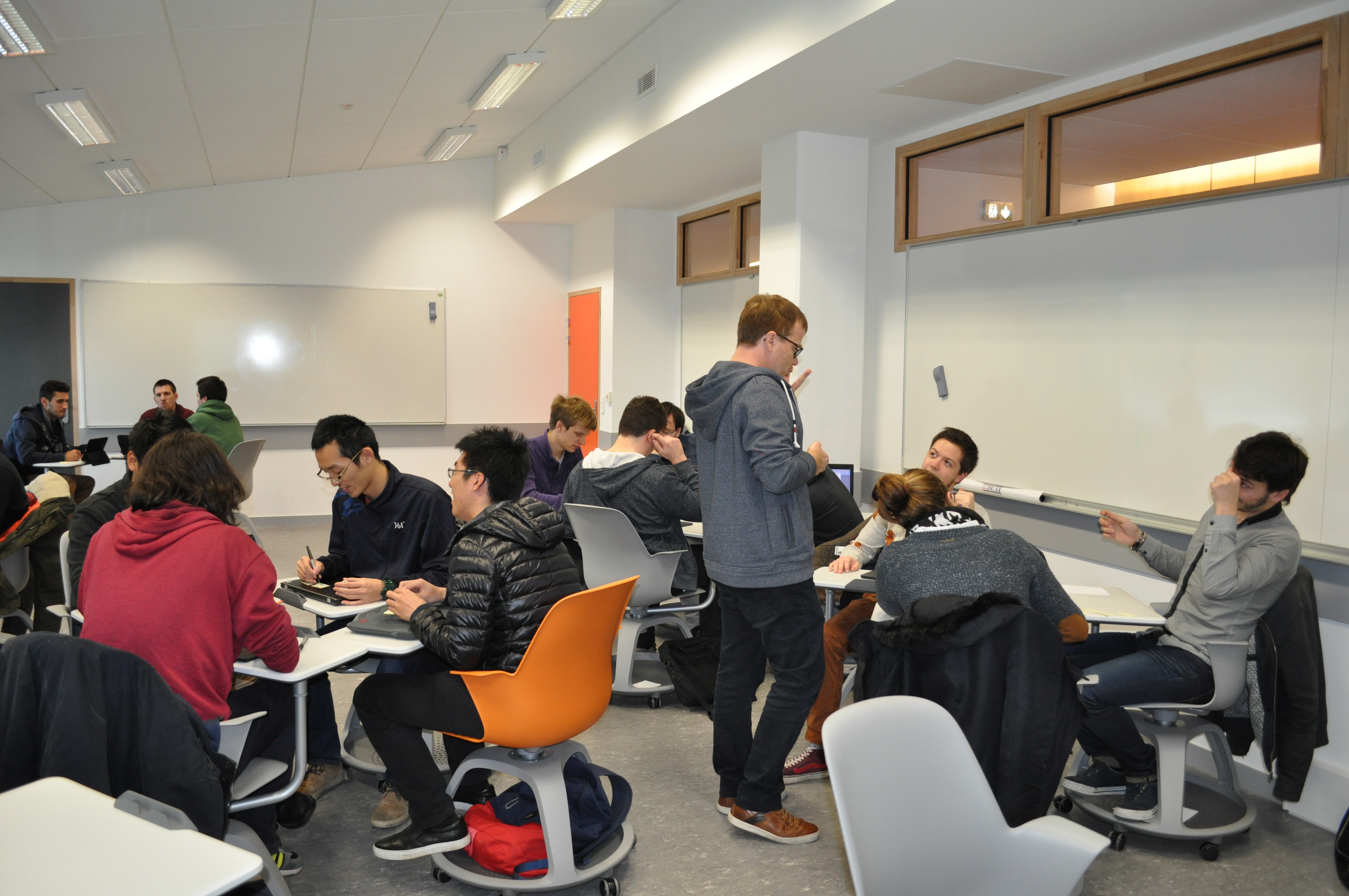- Faculty
- Duration
-
- 3 years
- Places
- Nantes
- Internship(s)
- Yes
Computer Science

Résumé
Accredited by the 'Commission des Titres d'Ingénieur' (CTI). Read moreAccéder aux sections de la fiche
Call to actions
Brochure(s)
Details
International
- Periods spent abroad
-
Yes, Compulsory
A stay of at least 13 weeks abroad is compulsory during the three years of study. This mobility can take the form of a summer internship, an end-of-studies internship or a semester abroad.
Targeted audience
- Targeted audience
- Bac + 2 ; Bac + 4
Available in
Initial education (3 years)
Work and study program
Opportunities are open for professional training contracts during the 5th year of the engineering studies.
Gap year
A gap year is possible during the engineering cycle.
Peculiarities
-
INFORMATION AND KNOWLEDGE SYSTEMS
-
SOFTWARE ENGINEERING
-
NETWORKS, SYSTEMS, CLOUD
-
DECISION-BASED COMPUTING
-
DATA MANAGEMENT AND DIGITAL CONTENT
-
MULTIMEDIA AND INTERACTION
Introduction
Every year, Polytech Nantes delivers approximately 70 engineering degrees in the computer science specialty: they design and implement the digital transformation of the economy and of the civil society.
- 1st year of the engineering (Master’s) degree:
Training begins with a one-year foundation course on the fundamentals of computer science (algorithmic and software engineering, information systems and databases, system and networks, mathematics for computer science), knowledge of the socio-economic world and languages.
- 2nd year of the engineering (Master’s) degree:
This 2nd year is organized around a common core (a significant project in partnership with a company, an interdisciplinary web & design project, advanced databases, artificial intelligence, data analysis, cryptography, C ++, career planning, ...). In addition, depending on the option, students can choose between specializations in business intelligence (data scientist profile) (data mining and warehousing, knowledge management, datavisualisation, etc.) or in software, network and multimedia (eg functional programming, development tools, image processing, parallelism, etc.).
- 3rd year of the engineering (Master’s) degree:
The 5th and final year of the degree offers 3 options:
· Business Intelligence (predictive analysis, semantic web, natural language, advanced databases, ...),
· Management of digital contents (architecture of information systems and advanced databases, web, exploitation of personal data and data mining, innovative human-machine interactions, etc.),
· Cloud-System Networks (design, administration, security of computer systems and networks, etc.).
Objectives
- Analyzing the needs of customers and users
- Designing the architecture and components of a software solution
- Developing, testing, integrating and deploying software
- Taking an interest in the new uses of digital technologies in society and the economy
- Incorporating technological and scientific progress into solutions
Highlights
In the final year of the engineering degree:
The 5th year students work for one semester on a research or R&D project at a rate of one day per week, in partnership with the laboratories of the discipline linked with the school (The CNRS laboratory LS2N - Laboratory of Digital Sciences of Nantes), of which the research professors of the IT department are members.
In the 5th year, students can follow, in parallel with their option, the DESSiiN University Degree (Design of Innovative Interactive Services) in partnership with the Nantes Atlantique School of Design and IMT Atlantique. Training takes place during the first semester of the last year of the degree.
Places
Nantes
Engineering students attend the Campus of La Chantrerie in Nantes.Programme Leader(s)
Admission
Entry requirement
Academic requirement
Admission process for French speaking students
French speaking students can apply directly on polytech-admission.org with a foreign scientific diploma and obtain a French engineering degree (Master’s degree in engineering). Selected students follow courses with fellow French students. Depending on the country where applicants are studying, they may be required to follow the “Etudes en France” studies & visa application process.
Admission process for non-French speaking students in Polytech partner universities
Initiated by the AVOSTTI Project, the Polytech Group has developed a 2 phase programme allowing students to start scientific/technological studies and French learning in their country and then to follow their engineering studies in France in one of its 15 engineering faculties. Current active partners are located in China : Ocean University of China (OUC) of Qingdao, South China University of Technology (SCUT - Guangzhou), Xidian University of Xi’an, etc.
Admission process for non-French speaking students from other universities
Several Polytech engineering faculties have developed bridging program (n+i, Polytech Mundus) allowing non-French speaking students (with a scientific Bachelor’s level) to gain French fluency and thus follow French engineering studies. The programme consists in a first year of intensive courses in French language and French scientific culture (with a scientific/technology major such as mechanics, computer science, electronics…) and 2 years of engineering studies among fellow French students.
- More information on www.polytech-reseau.org
Application
Application procedure
Programme

Computer science program
5th year options :
- Business Intelligence
- Management of digital contents
- Networks, systems and cloud
- Transversal option : Management de la Qualité, de la Sécurité et de l'Environnement
Academic team
Internship(s)
The engineering studies include three compulsory internships:
- 3rd year: internship in a company (4 weeks minimum)
- 4th year: Internship in the student’s specialisation in a company or laboratory (8 to 15 weeks)
- 5th year: end of studies internship in a contracted company or laboratory (18 weeks minimum)
Periods spent abroad
What's next?
Level of education obtained after completion
Further studies
The engineering degree also enables you to apply for a doctorate in a research laboratory or a company. During the 5th year of the engineering course, an initial research experience is acquired.
If Ph.D. work is a form of further education, because it leads to a degree, it is primarily a paid professional experience in research (production and scientific dissemination), sometimes accompanied by an initial experience in teaching. It is the preferred way to become a researcher or teacher-researcher in research organizations and in higher education, and to assume leadership roles in business R&D where technological innovation requires in-depth scientific expertise.Career opportunities
Business sectors
- Digitization of services (health, trade, education, transport, etc.)
- Digital industries (multimedia, video game, internet providers, etc.)
- Information systems, business data, data science (big data)
- Security, web, mobility
- Development Engineer
- Administrator (networks, IS)
- Consultant, expert, instructor
- Project manager
Registration
Tuition fee
Registration fees in the engineering studies (2022/2023)
Non scholarship-holder: 601* €
Scholarship-holder: 0 €
*Contribution of student life and campus : 95 €
Registration procedures
International office
Phone : +33(0)2 51 85 74 25
incoming.mobility@polytech.univ-nantes.fr

